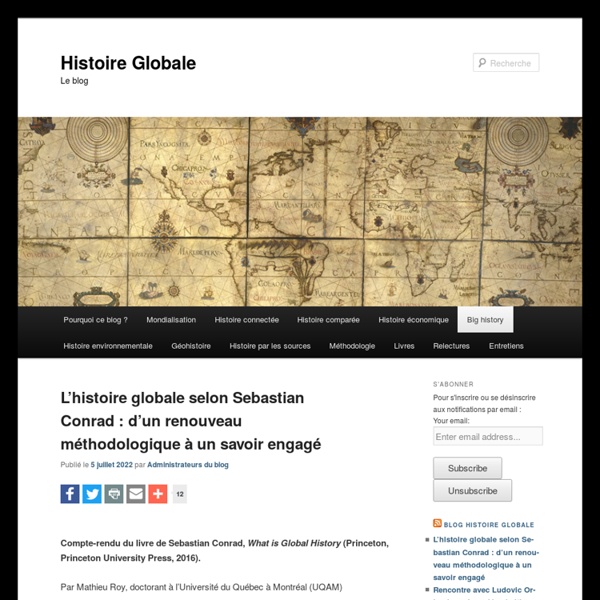



http://blogs.histoireglobale.com/
Le blog d'Histoire, Géographie et Education civique de J. Dorilleau Bonjour à tous, le travail de la semaine va consister à étudier la fin du chapitre 5 d’Histoire. Après l’unité italienne étudiée en classe, vous allez travailler l’unité allemande. Essayez de répondre aux questions sur le pdf et recopier le cours. Une étude de documents sur le chapitre sera proposée plus tard. Voici le diaporama sur cette partie avec le questionnement et le cours inclus dedans, en pdf
Une grande divergence Comment expliquer que l’Europe ait pris, au 19e siècle, un ascendant sur les autres parties du monde, au point de jouir pendant plus d’un siècle d’une suprématie indiscutable dans l’arène économique mondiale ? Parmi les nombreux travaux qui se sont attachés, au cours des dernières décennies, à revisiter cette vieille question, l’ouvrage de l’historien américain Kenneth Pomeranz, Une grande divergence, publié en anglais il y a dix ans à peine et récemment traduit en français (Albin Michel, 2010), fait figure de référence. Une référence incontournable, que tout spécialiste se doit de citer, même si c’est souvent pour la balayer d’un revers de main. Il faut dire que la thèse de Pomeranz prête le flanc à la simplification, elle qui se laisse résumer en une formule presque lapidaire. Jusqu’au début du 19e siècle, avance l’historien, l’Europe ne possédait aucun avantage décisif sur la Chine, grande puissance économique de l’époque. [1] A.G.
Un message top secret de la Seconde Guerre Mondiale découvert sur le squelette d’un pigeon Un message top-secret vient d’être découvert dans une maison du Comté de Surrey, au Royaume-Uni, demeure toute proche de l’hôtel où le maréchal Montgomery préparait le débarquement de Normandie. Lors du nettoyage d’une cheminée, le squelette d’un pigeon, dont l’une de ses pattes portait encore un petit tube rouge contenant un message secret et chiffré, a été découvert par le propriétaire. Composé de 27 groupes de cinq lettres écrits sur du papier à cigarette, ce message était destiné au X02, le centre de commandement des bombardements des forces britanniques, et provenait d’un certain Sergent Stott. Son contenu reste encore à décoder.
Culture matérielle, histoire du genre et des sexualités Des DOI (Digital Object Identifier) sont automatiquement ajoutés aux références par Bilbo, l'outil d'annotation bibliographique d'OpenEdition.Les utilisateurs des institutions abonnées à l'un des programmes freemium d'OpenEdition peuvent télécharger les références bibliographiques pour lesquelles Bilbo a trouvé un DOI. Le service d'export bibliographique est disponible pour les institutions qui ont souscrit à un des programmes freemium d'OpenEdition.Si vous souhaitez que votre institution souscrive à l'un des programmes freemium d'OpenEdition et bénéficie de ses services, écrivez à : access@openedition.org. Akou Heather Marie, 2011, The Politics of Dress in Somali Culture, Bloomington, Indiana University Press. Allman Jean (ed.), 2004, Fashioning Africa: power and the politics of dress, Bloomington, Indiana University Press. Arnold Christine, 2010, « An assessment of the gender dynamic in Fair Isle (Shetland) Knitwear », Textile History, 41/1, p. 86-98.
À la rencontre de nos 10 000 abonnés… et de nos lecteurs occasionnels Fin février 2004, nous partîmes 10 abonnés mais par un prompt renfort nous nous vîmes 1 000 en 2006, et… 10 000 fin mai 2016. Nous ne sommes pas peu fiers d’avoir atteint aujourd’hui le cap des 10 000 abonnés aux actualités de veille en éducation. Merci à ceux qui nous suivent depuis 12 ans, 12 mois, 12 jours ou 12 heures. La moitié de nos abonnés ont une adresse non institutionnelle, ce qui ne nous permet pas de connaître leur domaine ou pays d’activité. Parmi l’autre moitié, 22 % travaillent dans une académie, 9 % dans l’enseignement supérieur (dont les ESPE) et 3 % dans le domaine éducatif ou de la formation ; 7 % de nos abonnés sont domiciliés à l’étranger (majoritairement au Québec, en Suisse et en Belgique) ; un peu moins de 10 % se répartissent entre ministères et institutions, collectivités locales, entreprises, médias, bibliothèques et centres de documentation, éditeurs, secteur sanitaire et social, syndicats et association de parents.
Vidéos du 12e colloque annuel de la MAE – Maison Archéologie & Ethnologie, René-Ginouvès TRANSITIONS HISTORIQUES : rythmes, crises, héritages 10-11-12 juin 201512e colloque annuel de la MAEOrganisé par Pierre Allard (Préhistoire et Technologie), Monica Heintz (LESC) et Christel Müller (ArScAn) Consulter le programme Le blog de Marie Desmares Comme promis aux participants du stage Tice et histoire-géographie que j’ai co-animé la semaine dernière, je vous fais part de mon jugement concernant le pack clavier / souris sans fil Cordless desktop S520 de Logitech. J’avais en effet commandé ce matériel afin de résoudre les problèmes d’imprécision et de lenteur dûs à l’usage du stylet du TBI. Acheté sur les conseils de Logitech et en raison d’un prix abordable (59,99 € chez Logitech), le pack est décevant pour l’usage en classe : la connexion de la souris se rompt au-delà de 3 mètres, celle du clavier est fragile au fond de la salle de classe. Il faut placer le récepteur USB le plus loin possible de l’ordinateur et le plus proche possible du clavier en fonction de l’emplacement de celui-ci dans la salle de classe. Je déconseille donc ce pack.
Historiographie - Cour de France.fr Accueil / Historiographie et méthodologie / Historiographie 101 articles et ouvrages Haut Moyen Âge XIe-fin XVe siècle Histoire-Géographie et Education Civique au collège: nouveaux repères pour le Diplôme national du Brevet A partir de septembre 2012 (pour la session de juin 2013) Repères géographiques A la fin de la scolarité obligatoire, l'élève doit être capable de localiser et situer les repères suivants Classe de 6ème : Les continents et les océans, les grands fleuves, les grands traits du relief (principales chaînes de montagnes et grandes plaines) et les principales zones climatiques de la planète ;
cette perle est un bijou de refléxions. de nombreux sujets traités, et des plus intéressants qui plus est! by emdoulila Sep 7